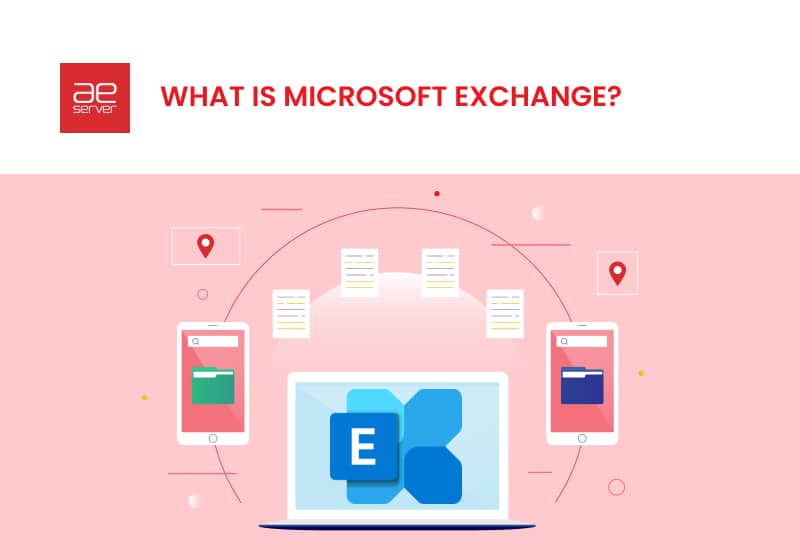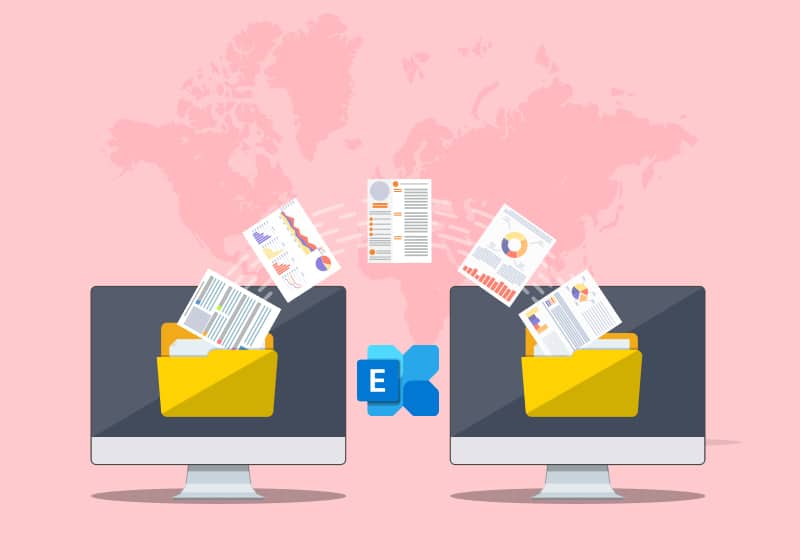
What is Microsoft Exchange?
Microsoft Exchange is a powerful and versatile platform developed by Microsoft Corporation. It has revolutionized organizing email solutions, calendars, contacts, and tasks in a corporate environment. This technology, introduced in 1996, has become the foundation for many organizations worldwide. It provides reliable and efficient management of communications and information.
This technology allows companies to create and maintain corporate mailboxes. It also fully synchronizes data across devices and facilitates collaboration between employees. Its key features are group calendars, shared folders, integration with Microsoft Outlook, and more. Besides, these solutions provide high security and data access control. It is essential in organizations dealing with sensitive information. It also allows administrators to scale and manage the system quickly, ensuring the smooth operation of mail servers.
In today’s world, effective communication and collaboration play a key role in the success of organizations. Microsoft Exchange remains an essential infrastructure for sharing information and managing work tasks.
Key Features of Microsoft Exchange
Microsoft Exchange is a feature-rich email and corporate communications management platform. This system has some key features that make it indispensable for many organizations. Let’s take a closer look at the main features of this platform:
- Email and calendars
Technology provides powerful tools for organizing email and managing calendars. Users can create and send email messages and manage their personal and shared calendars, appointments, and tasks.
- Collaboration
The platform provides the ability to collaborate with colleagues and partners. Users can easily combine calendars, create shared folders and tasks, and share contacts or documents. It makes coordination within an organization much easier.
- High security
The platform protects your confidential data and emails with a variety of mechanisms. These may include data encryption, anti-virus protection, and spam filtering. Administrators can set security and monitoring policies.
- Mobile accessibility
The platform supports synchronization with mobile devices. It allows users to access mail, calendars, and contacts anytime. This ensures mobility and increases employee productivity.
- High availability and scalability
Microsoft Exchange provides high data availability through redundancy and fault tolerance features. It also scales according to the needs of the organization. It allows you to manage business growth without incurring significant infrastructure costs.
- Integration with other Microsoft products
Exchange integrates with other products such as Outlook, SharePoint, and Teams to provide a unified and convenient work environment.
- Automation and rules
With rules and automation, users can customize the handling of incoming mail and tasks. It helps to optimize workflows and increase efficiency.
Exchange remains one of the most popular solutions for managing corporate communications. It is also a good choice for companies looking to streamline their workflows and ensure efficient organization. Apart from this, Microsoft email is also considered a high-quality product. This is your choice if you want to get results without any hassle.

How Microsoft Exchange Works
It is a multitasking platform for managing email, calendars, contacts, and other information. This technology enables effective communication and data sharing, and needs to understand how it works. So, if you don’t know what exchange server is, let’s find out now.
- Clients and Servers
Microsoft Exchange server includes client and server components. Clients can be Outlook, Outlook Web App (OWA), mobile devices, and other applications that use protocols such as Exchange ActiveSync or Outlook Anywhere. Servers run on the server side and provide data access and storage.
- Server Roles
Exchange uses different server roles to perform various functions. For example, Client Access Server (CAS) roles provide client access to the server. And there are Mailbox Server roles that manage user mailboxes and store data. This division into roles allows you to manage resources more efficiently and scale the system based on the organization’s needs.
- Mailboxes
The main element in Exchange is mailboxes, where users store their e-mail messages, contacts, and calendars. Users usually have their own mailbox, generally stored on the server.
- Protocols
Various protocols are used to exchange data between clients and servers. These can be Exchange ActiveSync, MAPI, POP3, and IMAP. They provide data synchronization between clients and servers.
- Data Storage
The platform uses special databases (usually Microsoft SQL Server). This is necessary to store emails, calendars, and contacts. These databases provide reliable and scalable data storage.
- Client functions
Users can send and receive emails, create appointments, manage contacts, and share information. The software also provides the ability to collaborate on documents and tasks.
- Administration
Administrators can manage Exchange using a dedicated administrator interface. They can set delivery rules, monitor server performance, and provide data backups.
It makes Microsoft Exchange one of the most popular and influential platforms for organizing communications. It also dramatically improves data management in the corporate environment. With its help, organizations can ensure efficient employee interaction and manage information.
Benefits of Using Microsoft Exchange
As we mentioned above, the platform provides Microsoft professional email, which many people like. Microsoft Exchange is an indispensable tool, providing a productive and secure work environment. Organizations using this platform get access to a wide range of tools and features. They improve workflows, enable more reliable communication, and increase data security. Below, we look at the benefits of this platform and how it can improve business efficiency and effectiveness.
- Effective communication
It provides fast delivery of electronic messages, which facilitates more effective communication. Users can send and receive email and make video and audio calls through integrated Microsoft Teams.
- Cloud Solutions
Microsoft offers a cloud-based version of Exchange known as Exchange Online. It eliminates the need for your infrastructure and provides flexibility and scalability.
- Compliance and archiving
Exchange enables organizations to comply with legal requirements and data retention policies. This comes through email archiving and access control.
- Cost-effectiveness
The platform can be a cost-effective solution for enterprises. It is because it offers flexible licensing and maintenance models. Exchange can also help businesses save on IT infrastructure costs. It does not require the installation and maintenance of server hardware.
- Top-notch support
Microsoft offers extensive support for Exchange, including documentation, training materials, and telephone support. This means that administrators can easily deploy and support the platform in their organization.
Microsoft Exchange is a powerful and reliable messaging system that can offer businesses some benefits. It provides a wide range of features that can help improve collaboration and data security. The platform can also be a cost-effective solution for businesses.
Microsoft Exchange vs. Other Email Solutions
Microsoft Exchange is an enterprise messaging system that offers a wide range of features for businesses. However, Exchange is not the only email solution available on the market. There are a number of other solutions that may be suitable for certain business needs.
| Function | Microsoft Exchange | Google Workspace | AEserver email | Zoho Mail | Open-Xchange |
| Functionality | Mailbox management, collaboration features, mobile support and security. | Basic feature set, advanced features available at an additional cost. | A wide range of features. Additional functions are available at an extra cost. | Mailbox management, collaboration features and mobile support. | An open platform that is customizable. |
| Safety | Uses advanced security technologies to protect data from unauthorized access, fraud and viruses. | Offers a range of security features. | Offers security features, including encryption, spam filtering, and anti-virus protection. | Spam filtering, antivirus protection. | Basic safety functions |
| Pricing | Cloud and on-premises licensing models. | Cloud-based licensing model. | Offers flexible licensing models, including cloud and on-premises options. | Cloud-based licensing model. | Cloud and on-premises licensing models. |
| Support | Offers extensive support, including documentation, training materials, and phone support. | ||||
As we can see, of all the competitors to Microsoft Exchange, AEserver email is the most closely matched. This can be a good alternative for businesses needing an easy and affordable email system deployment. The platform offers a basic set of features, including:
- Mailbox management. AeServer email allows users to create and manage mailboxes.
- Collaboration features. The platform allows users to collaborate on documents and calendars.
- Mobile support. It supports a wide range of mobile devices.
- Security. Email utilizes many security features, including encryption, spam filtering, and anti-virus protection.
Conclusion
Microsoft Exchange is a powerful, comprehensive email, collaboration, and data exchange platform. This technology, providing an extensive set of tools and features, has become an integral part of the modern work environment. Organizations using this platform gain access to a reliable and efficient tool. It helps with messaging, meeting scheduling, document collaboration, and contact management. This software provides ease of use and scales with the organization’s growing needs.
Whether you’re a small firm, a large enterprise, or on the road to digital transformation. It provides the tools you need to increase productivity and strengthen collaboration. Microsoft Exchange remains a reliable and in-demand solution in today’s world. It improves business processes and provides more efficient interaction in the organization.
FAQ
Microsoft Exchange can be used by organizations of all sizes, from small businesses to large enterprises. It is particularly well-suited for organizations that need a reliable and secure platform for managing large volumes of email and other communication data.
Microsoft Exchange is available in a variety of pricing options, depending on the features and functionality required. Organizations can purchase Exchange on a perpetual license basis or subscribe to Exchange Online, a cloud-based version of Exchange.
No, Microsoft Exchange and Outlook are not the same. Microsoft Exchange is a server software that provides email and collaboration services, while Outlook is an email client application that users can use to access their Exchange mailbox. Outlook is often used as the primary interface to interact with Exchange, but they are distinct components.
Yes, Microsoft Exchange can be hosted in the cloud through services like Microsoft 365 (formerly known as Office 365) and Exchange Online.



